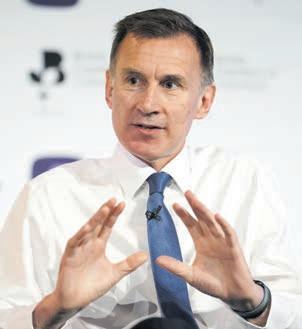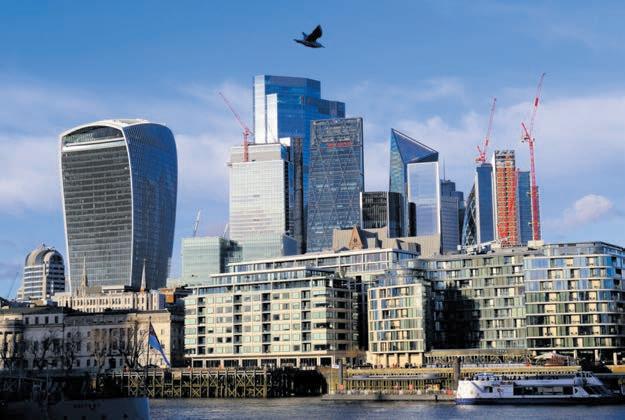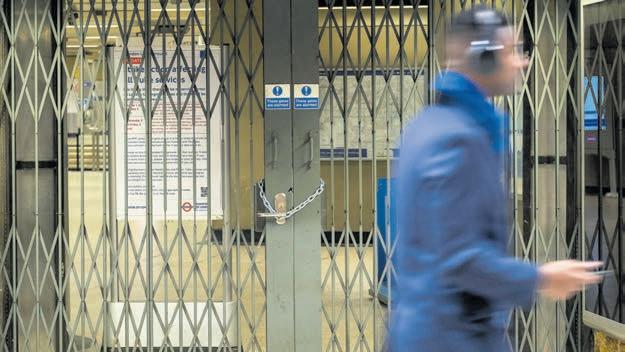LONDON’S BUSINESS NEWSPAPER
ASTON MARTIN DB12 A GLAMOROUS CAR FOR BRAND’S NEW ERA P17

BIZ AS USUAL KANE LOOKING FORWARD TO TRAINING, SAYS MANAGER P18




CHARLIE CONCHIE
TOP CITY figures cheered last night as UK pension giants threw their weight behind a package of reforms that aim to unleash a £75bn wave of investment into Britain’s private companies.
Aviva, L&G, Phoenix and Scottish
Widows are among the names to back the new “Mansion House Compact” that will see them divert a minimum of five per cent of defined contribution (DC) pension cash into unlisted British companies by 2030.

Firms to back the commitment, which also include Aegon, Nest, Smart Pensions, M&G and Mercers, make up the majority of the UK’s £1.2 trillion DC workplace pensions market. The move comes after months of wrangling between City groups and the pension sector to try and get cash flowing into the so-called productive economy. Pension funds currently allocate a tiny chunk of their cash to private investment and have instead poured into FTSE 100 firms and safer bond holdings.
The Chancellor Jeremy Hunt unveiled the package at the annual Mansion House speech last night as part of a wider package of measures dubbed the Mansion House Reforms, which he said will boost returns for savers as well as fuel a new wave of British startups. The move was hailed as a “historic turning point” by the Lord Mayor of London Nicholas Lyons, who has spearheaded calls to get more pension investment in startups.

The dearth of retiree cash flowing into private companies has spurred firms to
look to foreign investors and pension funds to raise capital. Sir John Symonds, chair of GSK, who helped draw up the plans, said the move would help firms “stay in this country as they scale to maturity”. Ministers will also look to push Local Government Pension Schemes toward greater consolidation to try and double existing investments in private equity to 10 per cent, which they claim could unlock a further £25bn by 2030.
£ CONTINUED ON PAGE 2
JESS
JONESBT ANNOUNCED yesterday its CEO Philip Jansen (pictured) would be exiting within the next year, amid whispers the telecoms giant could be a takeover target for German outfit Deutsche Telekom. Jansen will step down at an “appropriate moment”, the firm said, with most analysts tipping consumer boss Marc Allera as Jansen’s most likely internal successor.
Deutsche Telekom holds a more than 10 per cent stake in BT and the latter’s dramatic share price tumble –down 45 per cent over the last five years –could potentially make for an appealing acquisition.
Deutsche’s boss said earlier this year “I want my money back” after the stake he accrued in 2015 for £5.6bn shrunk by almost £4bn. “There will be a time when we will do a deal,” he said back then.
BT chairman Adam Crozier said a nominations committee was going through a formal appointments process for the top job, with the firm hoping to update markets “over the course of the summer”. He thanked Jansen for beginning BT’s ‘transformation’, with a dramatic job cuts programme in its infancy.

Grounded: Newham blocks City Airport’s bid to expand numbers and flying hours
NEWHAM Council yesterday voted to block City Airport’s plans to expand its passenger capacity and flying hours –despite the promise of more than 2,000 additional jobs.

The airport had submitted plans to remove restrictions which prevent takeoffs and landings between 1pm on
Saturday afternoons and 12:30am on Sundays, and to introduce three additional flights between 6:30 and 7am on weekdays.
The airport also wanted to up a cap on passenger numbers from 5m to 9m.
Robert Sinclair, London City Airport’s chief executive, argued the plans would have allowed

“airlines to serve the very significant demand for travel on weekends... giving more choice and more destinations”. However councillors, one of whom described the airport as a “blight” and an “inexcusable misuse of land”, voted against the proposals, citing concerns over noise pollution.
London City said it was “disappointed with the decision”,
adding that its revised proposals would have created almost 2,200 jobs at the airport and contributed an extra £702m in GVA to London’s economy. Newham is one of the capital’s poorest boroughs. “If we’re asking the airport to not grow we’re essentially asking the airport to go backwards,” Lloyd Johnson, chair of the local chamber of commerce, said.
LOW GROWTH and an aging population does not a happy mix make.
To give Britain a fighting chance of dealing with it, something substantive within the economy needs to change.
Jeremy Hunt’s pact with Britain’s largest pension funds, and a promise of more work to come, makes for a welcome start. He is right to have pulled away from the briefly mooted idea of mandating funds invest in areas

they might not want to; that would have been a recipe for disaster. He’s also right to have made the distinction between defined contribution funds, which can be used more productively for the good of the wider UK economy, and defined
benefit schemes, which cannot and should not have undue exposure to anything which might jeopardise the regular returns they have promised their customers. And he’s right to start with the biggest players, with the nudge to smaller, inefficient funds to consider merging into more substantial operations with the heft and clout to support British businesses and capital markets whilst also doing a better job for retirees.

There will of course be devil in the detail; progress towards this voluntary five per cent target will be interesting to monitor. But one thing in particular should be welcomed: a Chancellor willing to take a calculated risk.
It has seemed for years now that Britain has something of an aversion to the R word, yet it is at the heart of enterprise itself. Managed risk is the business of the City. The government getting on board should be welcomed.
New data showing China on the edge of deflation has fuelled calls for a stronger stimulus package for the world’s second-biggest economy as its postCovid recovery continues to stutter.
THE GUARDIAN UK GAMBLING LOBBY GROUP ACCUSED OF INACCURACY ON REGULATION
The main lobby group for the UK gambling industry has been accused of making inaccurate statements relating to the regulation of the sector as its boss prepares to appear at parliament.
THE TIMES
REVOLUT COUNTS $20M COST OF SYSTEMS LOOPHOLE FRAUD
Criminals successfully exploited a glitch in the payment systems at money transfer platform Revolut in order to steal more than $20m from the company’s funds.
CONTINUED FROM P1
The measures come as ministers and regulators look to revive the floundering fortunes of the Square Mile by stripping back red tape and incentivising more firms to come to market.
Hunt announced further changes to the UK’s listings regime including streamlining the prospectuses firms are required to draw up for investors.

Ministers also said they would accept the recommendations of a new Research Review with the eventual aim of ditching EU-era unbundling rules.
Mifid II, the inherited EU law, re-

quires brokers to charge a separate fee for research and has been blamed for hammering the quality of research into British plc.
The Chancellor’s plans were also welcomed last night by UK Finance chief executive David Postings, who said the reforms would help ensure the UK’s financial services sector remained competitive.
“These reforms will help support economic growth and bolster our capital markets by delivering more investment and making it easier for companies to grow and list here in the UK,” he said.
BRITAIN’s world-beating science base matched with the untapped potential of UK pension funds is a dream team combination – and the Mansion House speech may have been the moment that brought it all together.
Get it right, and we can unleash boundless new energy for the UK economy. Our universities and labs are teeming with innovation.
But what’s equally important is making sure the pensions funds and insurers who hold the keys to this capital know what’s in it for them.
Having invested in science and technology companies for many years, I know how critically British companies need the funds to scale. Many want to keep calling Britain home, and if they can access capital, they will.
This lack of British support from home-grown companies is why we’ve been backing the Chancellor’s plans to evolve City regulations.
Since the 1990s, British funds have slashed the amount they invest in British stocks and companies. It’s been foreign counterparts who
Greg Smith
CEO of IP Group, a science and innovation champion and investor
have filled the gap – and reaped the rewards.
Pension funds from the US, Canada, Australia and Japan have long known that investment into innovative UK companies can offer returns that beat bonds or other asset classes hands down. If the UK’s pensions and insurance industry can embrace current reforms, including the Chancellor’s ‘Golden Rules’, it could not only access these returns, but kick start a wave of confidence across the market.
I still have questions about exactly how the Chancellor’s plans will work for different types of pension funds. But it’s clear maintaining the status quo would be a missed opportunity.
These reforms could not only help give UK
science superpower status but bring the entire economy with it.
And the result? Better net returns for UK pension funds. And impactful science and technology businesses that can lead to thousands of jobs in the sectors of tomorrow, huge gains in productivity, and technology. And for pension savers, a better retirement, in a healthier, cleaner and tech-enriched future.
My own firm, IP Group, has been backed by British pensions funds for years. I can point to Railpen as our largest shareholder, and Phoenix and Border to Coast as key backers. They know the importance of working with trusted experts to carefully manage investments in a range of innovative sectors. We’re living proof of why pensions can count on science.
It’s right the Chancellor will avoid forcing investors hands, but the reasons for choosing to back UK science should be clear: greater returns, greater growth, and greater impact.
Let’s hope the Chancellor can bring British science and British pensions together again.
SHARES in legal services outfit DWF rocketed yesterday after the firm revealed it was in talks with Londonbased Inflexion Private Equity Partners regarding a possible buyout.
In a statement to the London Stock Exchange yesterday, DWF said it was in talks for a deal worth about £342m.
Shares in DWF soared to close up 34 per cent at 87 pence apiece in trading yesterday, following media reports on the possible takeover.
DWF said its shareholders would receive 100 pence per share, which includes a cash consideration of 97 pence and a dividend of three pence for the six months to 30 April.

The offer represents a premium of 52.7 per cent to DWF’s Friday closing price.

Manchester-based DWF provides legal and business services to compa-
nies across sectors including financial, transport and energy and natural resources. It reported annual revenue of about £350m for fiscal year 2022.
The takeover bid comes after a quiet period for dealmaking in which volatile markets and rising interest rates have dissuaded buyers.
In a half-year review of takeover activity in the UK last week, Londonlisted investment bank Peel Hunt said dealmaking had “rebounded to an extent” this year and that private equity’s interest in listed firms had returned, but “not with the conviction that many anticipated”.
Just £12bn worth of take-private deals were tabled by buyers in the six months to the end of June, down 45 per cent on the second half of last year as macroeconomic volatility continued to weigh down the sector, according to analysis conducted by Peel Hunt.
Galaxy
THE BANK of England will have to keep on lifting interest rates if wages keep rising at a near record pace and businesses continue to pass on swelling costs, governor Andrew Bailey (pictured) signalled yesterday.

In a speech at the annual Mansion House bankers’ dinner, Bailey said price pressures emanating from the labour market would require more tightening if they persist.
He said the Bank is closely watching developments in the UK economy, “in particular, those in the labour market, in wage growth and in services price inflation – to assess whether pressures are proving more persistent”.
Analysts are closely watching the next batch of official data for clues on how high the Bank will lift rates.
Most experts reckon a repeat of last month’s larger rate rise is certain at the MPC’s next meeting on 3 August.
Bailey: Bank will hike rates again if needed
BELLISSIMO Lavazza chief hails global spirit of London as firm continues to grow
THEUK remains a
“sparkling” marketfor luxury
coffee firm Lavazza, the firm’s chairman Giuseppe Lavazza told City A.M. earlier this week. “It is a beautiful market, especially London, with huge opportunities,” he said, adding “the international flavour of the city is great and even after Brexit we didn’t have any trouble”.
SUNNY spells led Brits to loosen their purse strings slightly in June, new figures show, in a welcomed boost to retailers and pubs, though sales in restaurants flatlined.
Spending on non-essential items jumped 5.7 per cent in June, data by Barclays shows, while spending
at pubs, bars and clubs rose 8.4 per cent –the sector’s biggest boost since January. Inflated beverage costs added to this total.
“Pubs and bars benefitted from Brits soaking up the sunshine in beer gardens, while butchers and garden centres saw a jump thanks to the arrival of barbecue season,” Esme Harwood, director at Barclays, said.

However, spending in restaurants
plummeted to its lowest levels since January, down 8.2 per cent following another month of decline.
Figures from the British Retail Consortium also show food sales increased 9.8 per cent on a total basis and 10.1 per cent on a like-forlike basis over the three months to June. This is above the 12-month total average growth of 7.7 per cent for the month of June.
VODAFONE’s UK boss has warned the company’s £11bn investment in the UK’s 5G network is at risk if its merger with Three is blocked by the country’s competition regulator.
Without the deal, Vodafone “won’t be able to invest as much” or match the government’s new wireless ambitions, Ahmed Essam, CEO of Vodafone UK, said in an interview with The Times. The government outlined its Wireless



Infrastructure Strategy in April, which has a commitment to providing standalone 5G coverage nationwide by 2030.
The merged entity “will become a much more effective competitor”, Essam said. The deal is subject to approval from the Competition and Markets Authority (CMA), which is currently investigating the merger. City A.M. approached Vodafone, Three, the CMA and the government for comment.
proving the shopping experience for customers, according to The Times.
M&S IS looking to revamp its joint venture with Ocado as the high street stalwart grows frustrated with the firm’s poor performance, bringing the brand’s falling profits back to the forefront of investors’ minds.
M&S chairman Archie Norman told investors at the firm’s AGM last week that there was “work to do” regarding the performance of Ocado Retail.
Ocado is now expected to receive 40 per cent less in performance payments from M&S. It was supposed to hand Ocado £191m this year, its final payment for the joint venture deal, but the retailer is now said to have knocked £70m off.
A source familiar with the situation told City A.M. the “reset” referenced by Norman would look to promote greater collaboration between M&S and Ocado, with the phrase used to solidify both brands’ commitment to the joint venture, as opposed to an official makeover.
However, the brands will turn their focus to cost-cutting initiatives and im-

Ocado’s retail arm is only half of the company’s business model, as it also operates a grocery technology division which supplies warehouse robotics to bricks and mortar supermarkets.
“Ocado’s retail delivery business is around 20 years old and [it] has never consistently made a profit, on a statutory basis, other than during the pan-







demic, and then it was unable to scale up fast enough,” Russ Mould, investment director at AJ Bell told City A.M.



“That may tell you something, as may Ocado’s willingness to sell the initial 50 per cent stake.”





He added: “The jury is still out as to whether the operation can consistently make a profit or generate cash.”




The revamp comes as M&S begins to reap the rewards of its own transformation, having recently posted a near 10 per cent jump in revenue to £11.9bn.


DEBT-LADEN Thames Water has secured an extra £750m of equity funding from shareholders, as the firm races to avoid nationalisation.
The UK’s largest water supplier insisted it “maintains a strong liquidity position” yesterday, as ministers and watchdog Ofwat continued to discuss bringing it under public ownership. In an attempt to shore up its balance sheet amid a £14bn debt pile, the crisis-hit firm has been making desperate attempts to raise additional cash over the last few months, having previously raised £500m in March.
Thames Water said the funding secured yesterday was the “largest equity support package ever seen in the UK water sector and underscores [its] shareholders’ commitment to delivering Thames’s turnaround”.

The latest flow of cash into the company is less than Thames Water had been hoping to secure from investors –with regulator Ofwat revealing it was aiming to generate £1.5bn in funds from its stakeholders, meaning the supplier is still £250m short of its investment goal.
However, Thames Water said the latest funds should not be viewed as a paring back of support as “£750m is also the maximum we can feasibly spend over the next two years of this regulatory settlement period within our current delivery capacity”.
The latest fundraise comes as the firm announced its full-year results, revealing it had met only 55 per cent of its annual performance commitments and had paid no dividends in its last financial year. While it confirmed gross profits of £1.1bn over the 12 months, it made an underlying loss after tax of £132.3m.
THAMES Water’s reprieve yesterday may have refreshed the company’s coffers, but the firm remains parched of funding for its future ambitions.
After the news yesterday, the UK’s largest water supplier said it considers itself liquid with £4.4bn in the bank.
Interim co-chief executive Cathryn Ross insisted to the BBC yesterday that the utility giant was “absolutely not” close to being placed into special administration by the government, the fate met for collapsed energy supplier Bulb nearly two years ago. But there’s still a drought of funding
that is needed to fix frequent sewage spills, replenish creaking infrastructure, and rectify poor customer service.
Overall, the company remains £250m short of its £1.5bn target to fund its operating costs and investment plans for the next two years, while the latest tepid flow of cash comes with strings attached.



Thames Water also confirmed it is well short of the £2.5bn windfall it needs for the 2025-2030 operating window to be “financially resilient”,
which is essential for the supplier to lower leverage and reduce leaks.



But it is likely to remain on life support for years to come, propped up through erratic transfusions of investors cash.
This is a fate that’s bad for customers, business and the industry, making it essential to consider what reforms can be brought in to resolve this.
MPs will grill Thames Water and Ofwat bosses tomorrow over the crisis the industry faces – and their questions could be the first stage for finding answers to build a water sector the UK can be proud of.



LEAKY dealmakers have become an “endemic” problem as more than a third of all transactions globally are revealed by the press ahead of their official announcement, a new report has warned.
More than a third of all the 267 transactions worth $2bn or more last year were leaked to the circling journos, according to comms consultancy H/Advisors.
Western Europe and Asian financiers
were found to be the most talkative globally while those working in industries like aerospace, transport and retail were most likely to spill the beans to media.
Neil Bennett and Tom Johnson, global co-CEOs of H/Advisors, said firms need to be prepared for media interest right from the start of any transaction.
“Mergers and acquisitions rank among the most significant and complex events that any corporate leader or boardroom can face,” the
LAURA MCGUIRE
PROPERTY portal On The Market has warned of a challenging outlook for the year ahead as rate rises have led buyers to “wait and see” on house purchases whilst the market remains unsettled.
The estate agent told investors yesterday stubborn inflation and the high cost of living are contributing to a slowdown in housing market activity through the second leg of the year, which may impact its trading.
Last month, the Bank of England hiked interest rates by 0.5 per cent to cool inflation, however the move sent high street lenders to increase the costs of their mortgage deals.
“The volatility in the mortgage markets in particular is having a negative effect on transaction numbers,” On The Market said.
While the housing market was showing signs of recovery in early spring, the latest rate hikes have stalled these.
Just last week, figures from the Halifax House Price Index showed the average house price fell 0.1 per cent from the

month before, taking the average price to £285,932, meaning house prices have fallen 2.6 per cent over the last year High energy bills and mortgage costs have also impacted renters, with many landlords deciding to sell up as they can no longer afford to pay.
On The Market also warned the lettings market is seeing a “continuing but levelling” decline in new rental instructions, pushing up average rents.
“Competition is fierce for lettings properties, but fewer new tenancies also negatively impacts agents, with a significant proportion of their monthly income resulting from new lets and the management of their clients’ portfolios,” it explained.
The group recorded a profit for the year, with revenues of £34.4m and adjusted ebitda up 38 per cent to £8m.
On The Market chief Jason Tebb said: “After a strong 2022, the UK residential property market is in a state of flux. A generation of property owners are coming to terms with higher interest rates, mortgage affordability, record energy prices and high inflation.”
pair said.
“This research, looking at where and when the leaks occur, and how accurate they tend to be, demonstrates that any business needs to be wellprepared for media interest right from the start of an M&A process.”
The report found that 55 per cent of deals in the APAC region were leaked last year, only marginally ahead of western Europe where 48 per cent of deals were leaked.
The US was the least leaky, where only 28 per cent of deals were leaked.

CITY A.M. REPORTER
ONE IN six asset management groups could disappear in the next four years, a new survey has found, as a cocktail of pressures including high interest rates and a volatile market could see more firms go out of business or snapped up by bigger players.
Nearly three-quarters (73 per cent) of asset managers said they are considering a strategic consolidation with another asset manager, according to PwC’s annual Global Asset & Wealth Management Survey published yesterday. Stubborn inflation, market volatility and interest rate movements are by far the biggest concerns for investors and asset managers over the next 12 to 24 months, the survey of 500 asset managers and investors found. The prediction comes as global assets under management fell to $115.1 trillion in 2022 –nearly 10 per cent below the 2021 high of $127.5 trillion, representing the greatest decline in a decade.
Elsewhere, the survey found that more than 90 per cent of asset managers are already using disruptive technologies like artificial intelligence, big data and blockchain technology, with experts forecasting that the value of assets managed by robo-advisers will reach $5.9 trillion by 2027, more than double the figure of $2.5 trillion in 2022.
URVI DUGAR AND SHUBHAM KALIAM
SVB FINANCIAL GROUP has sued the US Federal Deposit Insurance Corp (FDIC) to recover the $1.93bn the regulator seized during its takeover of the failed Silicon Valley Bank (SVB) in March, according to a filing in a bankruptcy court on Sunday.

The lack of access to the funds was
impeding SVB Financial’s reorganisation, it said, adding the money should be generating over $100m in annual interest, without which it would likely have to seek costly and uncertain debtor-inpossession financing.
The FDIC has estimated SVB’s failure drained its insurance fund by $16bn and that while it determines SVB
Financial’s share of the rescue costs, it is legally able to hold the seized funds.
SVB Financial said in the filing while the FDIC asserted it has claims against the company to justify its refusal to pay, it has not identified even a single claim “despite [many] opportunities”.
The FDIC did not immediately respond to a Reuters request for comment.
Financiers in western Europe and Asia were found to be the most talkative












ZOOM is determined to bounce back from a post-pandemic slump by revamping its business and product offerings, a top boss at the firm has said.
“People have got used to a different lifestyle”, necessitating a fresh approach from Zoom, Frederik Maris, head of EMEA at Zoom, told City A.M. Beyond video meetings, Zoom is now gradually expanding into a platform offering a suite of products,
such as Zoom Contact Center, its video and webchat customer service feature.




It has also turned to artificial intelligence, with Zoom IQ – a tool that provides includes transcription translation of meetings, as well as data analytics to help coach sales professionals.



Maris said that managing multiple transitions simultaneously “puts a certain amount of pressure on the organisation” but he expressed satisfaction with the progress made thus far.

GUY TAYLOR
GATWICK’s £2.2bn expansion plans represent an “opportunity for us to encourage more long-haul flying,” its chief executive has said, as the West Sussex airport looks to muscle in on Heathrow’s dominance in the long-haul market.
“Certainly this will be an opportunity for us to encourage more long-haul flying to and from Gatwick and to and from London and the south east. There’s no question of that,” Stewart Wingate told City A.M.
“We want to compete with other London airports but also, particularly when we’re looking at long-haul routes, we know that we’re competing with airports across Europe, so it’s really important that we have that mindset of wanting to compete,” he said.
Last week, Gatwick announced it had submitted a £2.2bn planning application to the government for a second runway.
The proposals seek to bring its emergency runway into routine use, by moving the centre-line 12 metres to the north, allowing departures from the strip whilst meeting international safety standards.
The airport hopes this would boost both long-haul and short-haul flights.

Wingate explained that “the reason long-haul routes are important to us and to our regional economy is because long-haul planes tend to fly every day of the year. They’re not seasonal.”
He added: “They are larger aircraft, so they bring more passenger movement on the runway, and their passengers tend to have more economic activity. And certainly we see businesses flourish on both ends of the route. So, you know, for us, the long-haul growth will be important.”
Gatwick’s proposals are just one of a long list of airports seeking to expand this year, with London Stansted, London Luton and Heathrow all looking to boost routes and passenger numbers. London City Airport, which had been looking to expand its passenger count, yesterday had its bid rejected over noise concerns.
While acknowledging Microsoft as a main competitor, Maris said the rest of the market remains "fragmented", and he is optimistic Zoom has the potential to take advantage of this.
The Nasdaq-listed company currently has a share price of $66.2 (£51.9) – well below its 2020 peak of $493.7 (£386.9).
But in its latest quarterly earnings, Zoom lifted its annual revenue forecast to between $4.47bn–$4.49bn, and posted a three per cent year on year increase in its quarterly revenues.
GUY TAYLOR
SOME 180,000 holidaymakers were yesterday hit by Easyjet summer flight cancellations as the airline battles with the ongoing impacts of French Air Traffic Controller (ATC) walk-outs and the war in Ukraine. Around 1,700 departures in July, August and September are set to be grounded, with the majority of flights affected at Gatwick Airport, where Easyjet operates a quarter of its fleet.
Easyjet said 95 per cent of passengers had been rebooked onto

ALAN JONES
LONDON Underground drivers are to strike in a long-running dispute over pensions and conditions. Aslef said its members will walk out on 26 and 28 July, coinciding with industrial action by members of the Rail, Maritime and Transport union.
Finn Brennan, Aslef’s full-time organiser on London Underground, said: “We take action only when needed. Unfortunately, the last few weeks have shown that London Underground management are determined to try to push through detrimental changes – despite trade union opposition – if they think they can get away with it.”
He continued: “Their aim is an entirely flexible workforce with all existing agreements replaced –allowing them to cut hundreds more jobs and forcing those of us who remain to work harder for longer.” RMT members will take action from 23 July until 28 July with some form of strike or walkout every day except for 24 July in a similar dispute.
other flights.
A spokesperson said: “The whole industry is seeing challenging conditions this summer with more constrained air space due to the war in Ukraine resulting in unprecedented ATC delays, as well as further potential ATC strike action.
“We have therefore made some pre-emptive adjustments to our programme consolidating a small number of flights at Gatwick, where we have multiple daily frequencies, in order to help mitigate these external challenges on the day of
travel for our customers and we continue to operate around over 90,000 flights over this period.”
Carriers are facing tremendous difficulties ahead of what is expected to be a record summer of travel.
ATC restrictions as a result of France’s ongoing pension strikes and airspace closures due to the war in Ukraine have caused major disruption across Europe.
Easyjet said Gatwick had been more adversely affected by the ATC action than other hubs, due to how constrained the airport is.
NICHOLAS EARL
FOSSIL fuel producers will spend billions more this year to extend the production lifespan of existing oil and gas wells rather than embark on new projects, according to new research from Rystad Energy.
The research argues firms are pushing to make their operations more efficient amid a global economic downturn and growing cost pressures, and that spending on oil and gas well interventions will jump 20 per cent this year to £45.2bn.
Well interventions refer to when an oil and gas producer opts to extract addi-
tional resources from existing sites rather than new ones, with Rystad expecting a surge of developments as the focus on efficiency intensifies.

The intervention rate – how many oil and gas wells go through the intervention process – is forecast to reach 17 per cent in 2027, which would total about 260,000 wells globally.
To boost production rather than drill new wells, operators are expected to undertake intervention into mature assets that have been producing for more than five years, with relatively high production rates which are starting to show signs of decline.


undermentioned streets made several Orders on 6 July 2023 with the exception of Eldon Street, Star Alley and Walbrook
Carlisle Avenue (Entire Length) & Northumberland Alley (Entire Length) ---- Utility Works

CHARLIE
FINTECH trading platform Plus500 yesterday said it was reaping the rewards of its global growth push as the firm reported a boost in profits and revenues in the first half of the year.
The London-listed Israeli firm said revenues jumped 15 per cent to $368.5m (£287.5m) in the first six months of the year while its earnings before deductibles
Carthusian Street (Entire Length) & Charterhouse Square (Hayne Street to Carthusian Street) ---COL Scheme Works
Charterhouse Square (Hayne Street - Carthusian Street) ---- Utility Works
Crutched Friars (Crosswall to Jewry Street), India Street (Entire Length) & Jewry Street (Crutched Friars to Saracen’s Head Yard) ---- Resurfacing Works
Eldon Street Mobile Crane
Fore Street (Wood Street to Moor Lane) & Wood Street Resurfacing Works
Lothbury Utility Works
Mansion House Place (Entire Length) ---- COL Scheme Works
Prince’s Street (Mansion House Street - Lothbury) ---- COL Scheme Works
Prince’s Street (Mansion House Street - Lothbury) ---- COL Scheme Works
Star Alley Building Site
Walbrook (Junction with Queen Victoria Street) ---- COL Scheme Works
Ian Hughes

Director, City OperationsEnvironment Department
Dated 11 July 2023

jumped 17 per cent to $174.1m.
Plus500 said it was cashing in on the lucrative US futures market as it ramped up growth globally.
“We made significant progress in optimising our growth opportunities in the US and Japan, where we continue to make substantial investments to take advantage of the opportunities ahead,” David Zruia, Plus500 chief executive, said in a statement.
“Earlier this year the group
obtained a licence in the United Arab Emirates, demonstrating further progress in diversifying our geographic footprint across high growth markets,” he added.
Zruia told City A.M. earlier this year that its US expansion could deliver some $250m in revenues in the coming years. Shares in the firm jumped nearly three per cent after the update but the fintech is trading down over 15 per cent in the pastsix months.
ROLLS-ROYCE has argued that its plans for developing small modular reactors (SMRs) in the UK could drastically reduce wholesale energy prices, as it looks to steal a march on its rivals and secure government funding for its nuclear ambitions.
The British aerospace giant is currently leading a consortium of investors in a bid to build up to 30 scaled-down reactors across the UK as the government scrambles to boost the country’s nuclear power output.
Integration of 7.5GW of nuclear power from Rolls-Royce’s SMRs
would reduce wholesale prices by four per cent in 2035 and 13 per cent by 2040, according to research commissioned by Rolls-Royce and shared exclusively with
Rolls-Royce has set out proposals for 30 small nuclear reactors
City A.M.


“Gas leaves consumer bills vulnerable to price volatility, so by adding publicly funded SMRs to the UK grid and removing the need for new build gas,
we can stabilise electricity prices and reduce consumer bills,” the research said.
The Rolls-Royce research also argued that if all 30 of its planned SMRs were green-lit and constructed over the next decade, the government would be in line to reach its target of decarbonising the electricity grid by 2035. Rolls-Royce has already secured £210m of funding from the government, which has dithered over whether to directly offer more investment.
SPORT England Cricket refuses to cash in on Bazball, and it could be to Australia’s gain
IN 1948, the chair of the Colonial Development Corporation Lord Reith described the newly formed state-backed body’s role as to “do good without losing money”. Since then it has been through a number of understandable rejigs. It swapped its title for the Commonwealth Development Corporation in 1963, before winning a mandate from government to invest outside the Commonwealth in 1969. Last year it rebranded again, landing on the name British International Investment (BII).
But, as BII chief Nick O’Donohoe tells City A.M., its mission has stayed the same: fuelling private sector growth in developing economies.
“In order to stimulate development in poor countries, the growth of the private sector is fundamental,” he said.
“A growing private sector, whatever

industry you’re in, depends on the availability of capital. Our job is to continue to try to make capital available so companies, both big and small, can grow and hopefully increase prosperity in their country,”
O’Donohoe continued.
BII was given £9bn of government cash in 2021 and until 2025 will operate like any other investor: by relying on the success of its bets.
Despite the turbulent environment of the past year, BII has managed to fulfil its mandate of doing good while remaining comfortably in the black. The body made a profit after tax of £167.7m, while its total net assets increased to £8.1bn –up from £7.7bn the year prior, according to its forthcoming accounts seen exclusively by City A.M.

BII is also looking to bring the UK private sector along with it. A central part of O’Donohoe’s role is looking to corral investors and private sector firms to back projects in the developing world.
Vodafone has for instance struck a partnership with BII in Ethiopia to build out the country’s mobile service.
Africa dominates BII’s activity, with some £692m invested in firms across the continent last year out of a total £1.27bn invested throughout the year.
Its investment into battling climate change in the developing world has also ramped up dramatically. It invested £591m – 46 per cent of its total investments for 2022 – in green projects.
‘Impact investing’, in which investors bet on creating both a social or environmental impact as well as a financial return, has swelled in size as an industry and was valued at $2.5 trillion in 2021. The market will reach $6 trillion globally by 2031, predicts Allied Market Research.
15 years ago, O’Donohoe, then an investor at his own firm Big Society Capital, was in the room at the Rockefeller Centre when the term ‘impact investing’ was first coined and says it has ballooned well beyond what anyone expected. But, he adds, that has come in spite of the public’s indifference.
“I think the public at large tend to have a very narrow view of what [development support] means and it’s often focused on short term humanitarian relief,” he says.
“Vitally important though that is, it doesn’t provide an answer to the long term, to how you build long-term prosperity in countries.”
CHARLIE CONCHIEOn Wednesday 5th July, The Lord Mayor’s Appeal held the second in its series of Power of Inclusion Social Mobility Workshops. Kindly hosted by Janus Henderson Investors, over 60 participants gathered to discuss social mobility, exploring the value of formal and informal networks and how to build effective networks within their organisations.
The workshop series is a key element of the 2022-2024 Power of Inclusion programme, which aims to create a City that is inclusive and open to everyone regardless of background. Senior leaders, DEI champions and experts in social mobility came together to share best practice on policies and programmes and collaborate for effective change.
Chaired by Dan Robertson, Director of VERCIDA Consulting and Chair of the Power of Inclusion Senior Leadership Forum, the workshop focused on roundtable discussions exploring the biggest challenge to social mobility and key areas of best practice. Dan welcomed guests, providing an overview of Power of Inclusion and the Change Starts Together framework, which underpins the initiative and provides businesses with a set of five principles to support them to take an intersectional approach to addressing social mobility.
The Lord Mayor, Alderman Nicholas Lyons attended the breakfast and reminded participants of the importance of prioritising social mobility in their organisations in light of the recent study by The Bridge Group and KPMG which found that socio-economic background has the strongest effect on an individual’s career progression, compared to other diversity characteristics.
The first keynote speaker, Charlotte Biddle, Senior Global Benefits Consultant at Aon, shared her personal story and perspective. She also spoke about Aon’s newly set up Social Mobility Business Resource Group, launched last year, which has taken a number of practical steps to address social mobility within the organisation, such as developing the Work In-

Charlotte and other colleagues at Aon have openly shared their socio-economic backgrounds, how they overcame challenges and the advice they would give to anyone who has had similar experiences.
Next, Cat Greenwood-Smith, Partner at Freshfields Bruckhaus Deringer, shared her personal experiences and why inclusion is so important to her. A few years ago, Cat saw the need for a safe space for open dialogue and conversation about social mobility at the firm and set up the Social Mobility Network at Freshfields in
and getting buy-in at the highest levels of the firm.
Inspired by the keynote speeches which contained a range of practical tips, productive discussions then took place across the room. Recurring themes in the discussions included senior buy-in as the biggest barrier to policy change in an organisation, how best to address competition between Employee Resource Groups, and the need for active allyship.
If you would like to join the conversation at the next workshop in the
give you access to a range of social mobility resources, including the Change Starts Together framework, a guide to developing social mobility storytelling in your organisation, and case studies to help inform and inspire your social mobility strategy. Signing up will also en-
If you would like to learn more about the Power of Inclusion initiative, head to The Lord Mayor’s Appeal’s website and if you have any questions, please email us at inclusion@thelordmayorsappeal.org

THE FTSE 100 has done us all dirty yet again. Over and over it marches us up a hill only to send us back down again.

Former Bank of England governor Mark Carney is often referred to as the “unreliable boyfriend” of monetary policy making for his comments signalling he and the MPC would raise interest rates, only for them to sit on their hands.
For investors, that title would probably be better suited to the Footsie.
It wasn’t supposed to be this way.
At the start of the year, the index of Britain’s top companies raced out of the blocks. It powered far ahead of its Wall Street rivals the S&P 500, Dow Jones and Nasdaq. It also was beating away a challenge from Europe’s equivalent, the Stoxx 600.
February rolled around, and a landmark was smashed. For the first time ever, the FTSE 100 breached the 8,000 point threshold.
Reams and reams of column inches were dedicated to hailing the return of the London markets. This was to be the rebirth of the City, spearheaded by its flagship index.
The fundamentals were there.
Energy prices, though lower than their peaks reached in the immediate aftermath of Russia’s invasion of Ukraine, were said to be on a higher trajectory.
Good news for the big oil and gas firms (Shell and BP) that represent a big chunk of the FTSE 100.
China’s economic recovery was just getting under way after Beijing finally scrapped their zero Covid-19 policy. A fresh injection of demand into international commodity markets from the world’s largest consumer of raw materials could only be a boost for the FTSE’s miners.
Bizarrely, and perhaps with a pinch of hyperbole, some of the index’s constituents have been benefitting from the cost of living crisis.
B&M, the budget retailer, is among the best performers this year, up around 30 per cent, likely because Brits have been trading down to avoid skyrocketing prices among those pesky profiteering supermarkets.
The biggest upside for the FTSE in early 2023 was undoubtedly conviction over inflation’s steady drop.
Not only would that have eased pressure on household finances, it would have prevented what are now some pretty wild bets on peak interest rates (see JP Morgan’s seven per cent wager last week).
Blueprints were drawn. Pillars constructed. The FTSE 100 was ready to clinch the top index title this year.
Oh how wrong we were –again.
A really bad recent run of form has whittled away the FTSE’s 2023 gains. In fact, it is now down about 2.6 per cent. At its peak, the index’s advances were getting on for 10 per cent.
It’s obvious to see why such a fall from grace unfolded. Banking collapses in the US and Europe compelled traders globally to retreat from stock markets.
There was a genuine prospect of a tough 2009-style credit crunch gripping the global economy due to banks retaining cash for fear of lending to poorly managed outfits like Silicon Valley Bank and First Republic
Britain’s yield curve last week was the most inverted it has been in 23 years, Capital Economics pointed out in a recent note to clients. That’s a function of traders ditching gilts at an alarming pace of late. An important point must be made here. Britain is not running out of money. In fact, it runs budget deficits more often than not. The same goes for most rich countries. Instead, investors are both pricing in more interest rate rises from the Bank of England and demanding greater compensation for holding assets which have returns that are being eaten up by price increases. That is not the same as the Treasury’s coffers running dry.
up from the pandemic is fraying. The country’s manufacturing and services PMIs are getting close to crossing the 50 point threshold that separates growth and contraction.

Weaker spending in the world’s second largest economy spells danger for the FTSE’s big players like Glencore and Rio Tinto.
Domestic instead of global factors are now by far the heaviest factor weighing on British stocks.
Inflation clearly is a lot worse than feared, with core, services and headline all rising faster than projected. In response, traders now think the UK is headed for an interest rate peak of 6.5 per cent, a level not seen since the 1990s. Not the best environment for equity investors, better for those in search of yield.


Recession risks are amping up. No one wants to be a stakeholder in a flagging economy. So, in short, the FTSE 100 has responded as one might expect amid a downturn –badly.


Across the pond, Wall Street is booming as the US flirts with a recession. Perhaps the UK’s premier index is therefore a more accurate reflection of its economy than its US counterpart.
But how London would love to have the ear of investors as New York does. The start of the year promised so much.
City A.M.’s economics editor Jack Barnett takes a deep dive into the state of the economy in his weekly column
At the start of the year, the FTSE 100’s rise signalled the City’s rebirth. Once more, we were wrong






LONDON’s FTSE 100 kicked off a new week just about in the green yesterday as a reduction in UK debt costs gave the index a reprieve from a torrid time of late.
The capital’s premier index edged 0.23 per cent higher to close at 7,273.80 points, while the domestically-focused mid-cap FTSE 250, which tends to be a better reflection of the health of the UK economy, jumped 0.13 per cent to 18,027.96 points.
Advances on London’s top index have been anchored recently by amplifying bets on further interest rate rises from central banks in the coming months.
The yield on the two-year gilt was broadly flat at 5.37 per cent, as was the rate on the 10-year instrument. Prices and yields move inversely.
Last week, the FTSE 100 closed at its
lowest level since November.
Cooling gilt yields kept pound sterling muted. It was flat against the US dollar, trading at $1.28.
Softer-than-expected inflation data from China kept risk sentiment subdued in the City. The rate of price changes is very close to negative territory, a signal that demand is curbing.
Lots of FTSE 100 firms generate their overseas earnings in China.
In London, BT boss Philip Jansen announced he will step down from his role in the coming year. The company’s FTSE 100 listed shares dropped 0.14 per cent on the news.
Bookmaker Flutter was best performer in the City, up nearly four per cent. Middle class favourite and online supermarket Ocado was the worst, shedding 1.76 per cent.
Oil prices climbed 0.3 per cent.
Peel Hunt has rated Knights a ‘buy’ after its ebita margin increased from 16.3 per cent to 17.7 per cent in its full year results. “The current year is said to have started ‘solidly’ and a return to positive organic growth is expected,” analysts said. Revenue in the year reached £142.1m, down 0.1 per cent.

Peel Hunt rated Gym Group a buy as it showed signs of recovery in line with the low-cost gym sector. As of March, like-for-like revenue recovered to -3 per cent (memberships -20 per cent ; pricing +17 per cent) compared to pre-Covid. “Falling wholesale energy costs could become a profit tailwind from 2024,” analysts said.

“London markets were treading water yesterday as investors braced for more economic curve balls from the week ahead. With jobs data first on the docket, investors will wonder what kind of line the UK economy is walking.”
DANNI HEWSON, AJ BELL
WITH prices on the rise and supermarkets under the spotlight - and even accused of profiteeringfood infrastructure has shot up our priorities list. And yet, an independent review, commissioned by the government, is trying to do away with a group of people who are key to getting fresh food on our tables.
Over the last few years, we’ve become more aware of the people picking our fruit. During the pandemic, we were urged to “pick for Britain” after travel restrictions hollowed out our supply of overseas labour. But the authors of the review, chaired by John Shropshire, effectively recommends bringing back pick for Britain as government policy. It calls for better recruitment tactics and training of the workforce, to eventually get to a point where pickers are sourced from the domestic workforce.
In 2021, the UK agri-food supply chain employed 4 million people, which is 13 per cent of the total UK workforce. People working in British fields historically come from Eastern Europe, but since 2016 there has been a steady decrease in the number of EU migrants working in the British food supply chain. A high number of these workers used to come from Ukraine and are now stuck in a warzone.
So the UK started recruiting from
South Asia, which brought its problems. People coming to the UK to work on a six months-long seasonal worker visa often pay lots of money back home to middle-men agencies - something illegal here - and don't manage to recoup the costs, entering what is described as “debt bondage”.
Both of these issues were at the forefront of the review. And of course, cutting down on supply-chain abuses is a noble aim. But central to this is simply preventing as many people coming from overseas. The very fact of this problem is a testament to why Brits don’t want to pluck apples from trees in September.

Farming is an unpredictable industry, victim to the whims of nature; this means seasonal workers sometimes
spend more to come to the UK than what they earn here. According to a report by the Land Workers Alliance and others released yesterday, seasonal workers picking soft fruit retain around 7.6 per cent of the total retail price of the produce. The supermarket gets 54.7 per cent of the value, and the farm gets 26.2 per cent. The report also finds the average pay of migrant farmworkers to be below the absolute poverty threshold.
To be fair, the authors of the review do recognise the vulnerability of this group of people, who usually have zero connections here and are afraid to speak up for fear of losing their visa. It recommended that “any new scheme must reduce labour exploitation risks by establishing an appropri-

ate legal framework” for seasonal workers. It suggests lengthening visas so that seasonal workers can stay here longer, work more and “offset incurred costs”. It points to the “employer pays principle” accepting employers should cover NHS health surcharges, but it doesn’t say anything about recruitment-related fees incurred by workers.
The review rightfully suggests the visa scheme should remain in place for at least five years. The UK doesn’t have the local workforce needed to keep the engines of the food machine running. A total of 45,000 visas will be available this year, with 10,000 more to hand if the government decides to. Home Secretary Suella Braverman can claim we shouldn’t “forget how to do things for
ourselves” all she likes, but the reality of UK farms remains one of job vacancies - especially for brute labour. What should have been central to this review is a stronger acknowledgement of the holes in the system, rather than trying to patch it over with a desire to just “be more British”. Bringing in more people through this visa scheme when basic problems haven’t been fixed would be irresponsible. You can’t base an entire industry on the precarious bet that people are so desperate for jobs that they will still come even with inadequate work conditions. Equally, the pressure on supermarkets to be responsible in their practices must extend all the way back through their supply chain. There has to be an industry response in how farms work with recruiters. The process must be streamlined, and agencies in the UK must take responsibility instead of shrugging off anything illegal that happens in the workers’ countries of origin before they come here.
We’re not the first country to struggle with this. In a letter to immigration minister Robert Jenrick, seen by City A.M., workers rights and employment lawyers point to the example of the Malaysian and Bangladeshi governments working together to recruit agricultural workers. Thanks to their cooperation, fee payment from workers to agencies was reduced by 8 to 10 times. Mexico and Canada have a similar arrangement.
Ensuring this industry works transparently is possible; the risk is that this government will put it on the shelf of the “too difficult to implement” policies and leave it there, or even worse, supplant reform with wishy-washy echoes of nationalism.
THE NEXT general election is fast approaching but we already know the main messages on which the election will be fought. Do the British public want more of the same, or do they want change? The “stick or twist” question has characterised many elections - 1992, 1997, and 2015 - and with varying results.

Historically, the key battleground for any election is the Westminster village, TV studios, and the editing rooms of newspapers. Party leaders make promises over lecterns, into microphones, and debate policy across benches. In recent years, we’ve also seen the proliferation of digital campaigning with micro-targeted ads flooding our social media newsfeeds.
Digital campaigning has been controversial, with concerns around data privacy, targeted ads based on personal information, and misinformation.
However, what this kind of digital campaigning has in common with the oldfashioned set piece media events is that it is still possible to study and track campaign messages. Technology companies have (to varying degrees) limited the political content that can be promoted and mandated transparency about who is paying for what ad. This is about to change. At the next general election, the battleground will be secret; taking place on Whatsapp, Telegram and Signal.
Each of these platforms opens up a new world of text, image, video and voice communication to political parties and, more worryingly, their outriders. What is more, they are effective.
How many advertisements do you remember seeing today? Probably a few?
How many unread emails do you have?
Thousands? How many unread messages do you have on WhatsApp? None?
It is not just the efficacy of these platforms that make them attractive during an election, it’s also their relative anonymity. All content exchanged is protected with end-to-end encryption, ensuring that only the intended recipient can read a message. There is no moderator fact-checking political messages or record of who is paying to spread what message. For political parties it also makes rebutting falsehoods almost impossible. A slur could be circulating for days, reaching thousands of voters before you get wind. Alarmingly, there are already multiple examples of messaging platforms facilitating disinformation campaigns around the world. The Brazilian presidential election of October 2018 stands
out as a notable example. A study conducted by the fact-checking platform Agencia Lupa, found that 56 per cent of the fifty most widely shared images in Brazilian political group chats during the election campaign were misleading. Many were considered completely false or used out of context.

These platforms also enable incredible speed, with the ability to ‘forward’ a message to other individuals or group chats. Following multiple deaths in India as a result of misinformation spread on WhatsApp networks, the platform has made attempts to moderate this feature and introduced ‘forward’ labels in 2019. They also limited the number of ‘forwards’ on a given message to either five individuals or groups. Each group can include up to 256 people, creating the possibility to
share it with nearly 1,300 individuals. Generative AI makes it easier than ever to create misinformationwhether that text, images or video. Pressure groups like Just Stop Oil will be able to leverage this technology to push out content at record speeds and at minimal cost. Be in no doubt the Russians are probably already pushing out hundreds of deep fake videos. All this might suggest why a mighty row is brewing about the impact of the Online Safety Bill on end-to-end encryption and the ability of these platforms to continue to operate in the UK. Bosses of messaging services Whatsapp, Signal and Element have warned the Bill “opens the door for mass surveillance” by government and that the end of end-to-end encryption “will be exploited by hackers, hostile nation states, and those wishing to do harm”. Given the history of these platforms’ use in elections around the globe, you can imagine the argument being met with rolled eyeballs in Westminster. Instead of dreaming up ways of using these technologies and their platforms to their partisan advantage, politicians should use their powers to limit all the ways they can be exploited to cause potential harm.

[Re: Government urged to take global lead on digitised capital markets to boost UK’s competitiveness, July 6]
Embracing Web3 – the next phase of technology – across key industries is essential to remaining competitive. Blockchain, the technology behind Web3 applications including tokenisation, is already providing realworld benefits across critical industries. In the energy sector, blockchain-based solutions are driving decarbonisation efforts. Across supply chains, blockchain is being used to improve efficiencies, cut costs and improve security by removing single points of failure via decentralisation. Tokenisation comprises an important
part of Web3, bringing important benefits including increased transparency, increased liquidity, lower transaction costs, and the ability to fractionalise assets.
As one of the driving sectors of the country, capital markets must be at the forefront of the transition to Web3. However, given its highly regulated nature, government support is crucial. While taking a cautious approach is crucial to avoid scandals and foster trust in the industry in order to facilitate long-term growth, it’s important to tread the line between protecting and stifling innovation. By working with the industry from the inside, the government can ensure it is taking bold action with confidence and education, and position the UK as the frontrunner in the global transition to a new technological era.
Alan Vey Aventus
AFTER riding a high for a number of years, there has been a growing wave of negativity and resistance towards making investment and business decisions based, in part, on Environmental, Social and Governance (ESG) considerations.
Some critics raise valid worries. Greenwashing, as companies seek to exaggerate their ESG efforts to gain greater favour from consumers and investors, is real. Increased interest in ESG investing has attracted less conscientious actors, who aim cynically to profit from the trend.
But all too often those criticising sustainable investment have ulterior motives, representing industries with high emissions, poor working conditions, or questionable governance – issues investors consider increasingly risky in the longer term. This self-serving agenda is undermining the essential transition to the sustainable future that we must embrace if we are to reach our climate change goals while
Few things hold such enduring fascination in British politics as the so-called “special relationship” with the US. It was blamed for Iraq, held up as a bastion of what could be achieved post-Brexit, and then dragged through the doldrums during a distancing between Boris Johnson and Joe Biden. Yesterday, Joe Biden and Rishi Sunak insisted cross-Atlantic relations were “rock solid” ahead of a crunch Nato summit today. Making nice with Washington
has been a driving force behind many of Sunak’s foreign policy decisions, most notably the Windsor Framework deal. Defence minister Alex Chalk was keen to talk down rumours of a rift between the two, after Biden promised to send cluster bombs to Ukraine. Britain is a member of a treaty banning the use of the bombs.
But both the provision of military aid and the ascension of Ukraine to Nato are at risk of driving a wedge between the US and UK.
at the same time making the UK a global leader in green finance. Sustainable investment, if done right, can revolutionise the way we create wealth, driving capital towards the innovative economies of the future, and helping make the UK not just a global leader in green finance, but in all sorts of low-carbon sectors as we reap the benefits of those investments.
It is about knowing that your investment is in a company that is well run, works hard to reduce its impact on the environment, and will be a positive force for the communities where it works. That virtuous circle will create the jobs and skills in the future sectors that the UK needs to develop to stay competitive in a changing world. Equally importantly from an investor
perspective, actively considering sustainability factors in investment is a key element of risk mitigation and management. How engaged the UK’s investors are in sustainability will be a core determinant of how successful both the UK economy, and a huge range of investment products, are in the longer term.

The government must be much more ambitious if it is to realise the vision it set out in its Green Finance Strategy. The plan is sound but implementation far too slow. When the government looks committed on climate change, investors and corporates follow; when the government appears to be lukewarm, companies take the same direction. We need to be much more confident in the UK’s potential as a global sustainable finance powerhouse, and how that can be a key economic gain to the country from the global transition to net zero.
Realistically, issues of benchmarking and standardisation are to be expected, as this is just the start of the journey. Having a moment of uncertainty in the sector is no bad thing, especially if it means there is a fresh look
at how sustainable funds function and are measured. However, without government action across the sector to establish clear standards, such as the creation of a credible, science-based Green Taxonomy, or corporate sustainability disclosures, the ability of the financial sector to support positive change in the UK, whilst supporting the UK economy’s advancement towards a prosperous, sustainable future, risks being undermined.
Time is not on our side. There are probably six parliaments left between now and 2050, in which successive governments will need to ensure they have made continuous progress on our journey to net zero. With a raft of worrying signs the UK is falling behind both in its achievements and commitments to climate change, I implore the government and the opposition to look at the potential for green finance to transform this area, and prevent it being an industry which falls by the wayside.
£ James Alexander is chief executive of the UK Sustainable Investment and Finance Association
Self-serving greenwashing is undermining a transition to a sustainable future


HAS THEREever been a time when we didn’t fear for Aston Martin’s future? During its 110 years, this much-loved British marque has battled through no less than seven bankruptcies. More recently, a disastrous IPO in 2018 saw its shares nosedive from an initial valuation of £19 to just 30p within 18 months. When Covid-19 arrived to compound the problem, it looked like Aston Martin’s luck might have run out.
And yet… Here we are in 2023, the sun is shining and Aston Martin has taken over Monaco’s fanciest hotel to launch the DB12 – ‘the first in a new generation of sports cars’.
Former Ferrari CEO Amedeo Felisa is at the helm, there is substantial fresh investment from Lawrence Stroll and Chinese carmaker Geely, and Fernando Alonso is regularly standing on the F1 podium. In the last quarter of 2022, Aston Martin even posted a small profit.
The DB12 seems to exemplify this newfound confidence. It is unmistakably an Aston Martin, with a classic GT silhouette, but burlier and more assertive than the DB11 it replaces. A head-turner even in glamorous Monaco, it looks every inch the next Bond car. Predictably, that’s something Aston Martin execs will neither confirm nor deny.
Product boss Alex Long says the DB12 offers “the performance and dynamics you would expect of a team competing successfully in Formula One’”. In practical terms, that means 29 per cent more power from the 4.0litre twin-turbo V8 engine (the key numbers are 680hp, 0-62mph in 3.3 seconds and 202mph), along with plenty of advanced chassis tech, including adaptive dampers, optional carbon-ceramic brakes and an electronic rear differential.
Long also points to the Michelin Pilot
ASTON MARTIN DB12
PRICE: £185,000 (EST.)
POWER: 680HP
0-62MPH: 3.3SECS
TOP SPEED: 202MPH

FUEL ECONOMY: TBC
DRY WEIGHT: 1,685KG

Sport 5 S tyres, which have ‘AML’ stamped on their sidewalls and a bespoke compound created specially for the DB12. Even the £3m Aston Martin Valkyrie, by contrast, used off-the-shelf Michelin Cup 2 rubber. “The investment in this car runs deep,” I’m told.
The Achilles’ heel of the DB11 was its woeful Mercedes-Benz media system, already outdated when the car was launched in 2016. That has been banished by a new 10.25-inch touchscreen, developed in-house and offering overthe-air updates, plus a connected smart-
phone app. In truth, this is Aston Martin catching up with the competition, rather than forging ahead, but it’s intuitive and doesn’t distract from the driving experience.
Good thing, too, because I’m headed to one of Europe’s finest roads: the Route Napoleon. With everything from hairpin hillclimbs to epic, empty straights, it’s a stern test for any car, particularly one pitched as a rival for the Ferrari Roma and Bentley Continental GT Speed. Can the DB12 live up to its looks?
I’ll spare you the suspense: it can. Indeed, the Aston Martin feels like a midpoint between the Ferrari and Bentley, its quick steering and nuanced body control combining with resolute and unflappable poise. The e-diff seems to lock the car onto its line, while those special Michelins serve up huge traction and immense cornering grip.
The AMG-derived V8 is a fitting foil
for the chassis, feeling muscular in the mid-range, then filling its lungs with a cultured snarl. While it isn’t as immersive or downright decadent as Aston Martin’s old-school V12 engine (not coming to this car, sadly), it monsters this road with awe-inspiring ease, serving up relentless acceleration as the eight-speed auto ‘box blams through the ratios.
You can never fully escape the DB12’s size and weight – the mid-engined McLaren Artura, for example, is more lucid and engaging – but this is a sumptuous grand tourer in the best tradition. There’s even space in the back for two (very) small children. Frankly, the Route Napoleon would seem special in a Dacia Sandero, yet the DB12 lends any journey a sense of occasion.
Aston Martin’s own journey from here is, as ever, filled with uncertainty. But the impressive new DB12 is a solid bedrock for whatever comes next.
ANEWevolution of the Pininfarina Battista electric hypercar will be in action at Goodwood later this week. The Battista Edizione Nino Farina will make its world debut at the Festival of Speed, driven by former Goodwood hillclimb record-holder Nick Heidfeld.
The 1,900hp ‘hyper GT’ is named after Nino Farina, the first F1 world champion and nephew of company founder Battista ‘Pinin’ Farina. Its carbon fibre body is finished in bespoke Rosso Nino paint, with bold ‘01’ side graphics and satin gold alloy wheels.
Automobili Pininfarina plans to build up to 150 examples of the £2m Battista at its facility in Turin. The
Edizione Nino Farina is limited to five cars, each with a unique plaque to celebrate five landmarks in Nino’s life and racing career.
One of the world’s fastest road cars, the Battista is closely related to the Croatian-built Rimac Nevera. With a 120kWh battery and four electric motors – one driving each wheel – it can rocket to 60mph in 1.79 seconds.
Top speed is 217mph.

As you’d hope from a company with the most famous name in car design, the Pininfarina is also rather beautiful.
If the Nevera is slightly generic and the rival Lotus Evija looks entirely sculpted by aerodynamics, the Battista combines function with elegant form.
The Battista Edizione Nino Farinawill be put through its paces at the Festival of Speed by Nick Heidfeld. Now a development driver for Pininfarina, Heidfeld has previously raced in F1 for Williams, Jordan and others.
In 1999, ‘Quick Nick’ also set the fastest time on the famous Goodwood hillclimb in a McLaren MP4/13 – a record that stood for 20 years. So expect him to make full use of the Battista’s prodigious power when he races up the Duke of Richmond’s driveway.
“Driving this car will be an experience much like pulling on the suit of a superhero. An exceptional and emotional experience is assured,” says Paolo Dellachà, CEO of Automobili Pininfarina. We can well believe it.
MATT HARDY
THE mesmerising story of unseeded Christopher Eubanks continued at Wimbledon yesterday as the American knocked out fifth seed Stefanos Tsitsipas in five sets on No2 Court.



Watched by fellow compatriot Coco Gauff, Eubanks fell 6-4 to his Greek opponent in the opening set before levelling the tie 1-1 with a 7-6 second set.
Having fallen 6-3 in the third, Eubanks rallied and won the fourth and fifth sets 6-4 to knock out a fancied seed from the men’s draw.
His prize for knocking out Tsitsipas –who toppled Andy Murray on Centre Court last week –is a last eight tie against Russian third seed Daniil Medvedev, who beat Jiri Lehecka yesterday after the Czech player retired when two sets down.
“I feel I’m living a dream right now,” Eubanks said after the win. “This is absolutely insane. I’ve tried to block everything out and focus on the next match but as cliched as it sounds, when you rattle off all that stuff [into his first Slam quarter-final] it’s surreal, it’s unbelievable. I can’t believe this.
“The funny thing about tennis is you’re not always going to play your best tennis, you’ve just got to play really good at certain times. I felt like I did that really well today. When it came to really important times, I felt like I executed really cleanly.”
World No1 Carlos Alcaraz came from a set down to beat Matteo Berrettini 3-6 6-3 6-3 6-3 on Centre Court last night.

The Spaniard was made to work for his victory on the show court but his win will see him face Denmark’s Holger Rune in the last eight with a potential semi-final tie against Medvedev or Eubanks.
As one storyline continued to dazzle the All England Club, another came to an end.
Russian teenager Mirra Andreeva fell in three sets to Madison Keys on No2 Court.
The 16-year-old took the first set but crumbled under the pressure against the seeded American, and was deducted a point for throwing her racket.

Fancied Ons Jabeur made light work of Petra Kvitova on Centre Court, beating the Czech 6-0 6-3 while her quarter-final opponent Elena Rybakina reached the last eight after her fourth round opponent Beatriz Haddad Maia retired just five games into the first set.
MATT HARDY
TOTTENHAM Hotspur boss Ange
Postecoglou has said star striker Harry Kane is looking forward to returning to training despite questions over his future at the north London club.

It is understood that Spurs have rejected an offer worth in the region of £70m for Kane from German giants Bayern Munich, believing he is worth beyond £100m.
“What I know right now is that Harry is part of this squad and he’s looking forward to coming back to
training and being amongst these players and starting to work together.
“I don’t think it’s my role to sit down and treat people in a manner because of their circumstances. I’m really big on treating everyone the same and Harry has already entrenched himself in the history of this football club.
“He’s a very important part. He’s one of the premier strikers in the world and I want him involved.
“My conversation with him will be about how we can make this club successful.”
FOOTBALL
FORMULA
THE future of the British Grand Prix could be close to being finalised with a contract with F1 “just a matter of time”, according to a leading motorsport figure.
Motorsport UK chief David Richards said: “I don’t think there is any question that the deal will get done. Both the BRDC [British Racing Drivers’ Club] and Liberty are keen to see that resolved and it is just a matter of time.
“We were hoping it would be announced this weekend – that wasn’t the case – but that is not because there is no willingness to get it done.”
A contract worth £100m was signed in 2019 and lasting five years, meaning it is up for renewal next year. Silverstone is seen as iconic on the F1 calendar –480,000 attended the weekend this year –but there has been a recent shift towards different tracks, especially in the Middle East and the United States.
“We don’t have a new contract yet,” Silverstone managing director Stuart Pringle told PA.
“But we are the most sustainable race in the championship – by virtue of having seven out of 10 teams located nearby, so there is no long-haul aviation.
“We have got 2,700 solar panels powering the Paddock Club. We have a huge recycling operation here and that is very important to F1 in helping them achieve their net zero carbon 2030 target.
“We have radically improved our entertainment programme.
“The races are thrilling and they get excellent television audiences.
“It is very popular with sponsors and VIPs.
“So I struggle to know what more we can do if that is not enough.
wearing shirts that include a sponsor, despite there being none yet.
CHELSEA have launched their new home kit without a sponsor after failing to find a new partner in time.
The Blues saw a deal with streaming service Paramount Plus fall foul of Premier League rules and broke off talks with online casino Stake.com in the face of supporter opposition.
The new Nike shirt, which borrows stylings from 1990s Chelsea kits, is being advertised without a sponsor name or logo on the front in publicity material. Supporters have been warned that the team may end up
“Fans should be aware that the 202324 home kit that features on pitch may subsequently feature a front-of-shirt partner,” Chelsea say on their website. “The club will communicate any changes to the kit in due course.”
Chelsea have been seeking a new sponsor since mobile network Three informed them that it would not be renewing its £40m-a-year deal when it expired at the end of last season. They are also in need of a new sleeve sponsor, with crypto platform WhaleFin also deciding against extending.
RARELY can a sports team have become as synonymous with a slogan or philosophy as the England men’s Test cricket side and Bazball.
It has proliferated every discussion of their successes and failures during the current Ashes series and since head coach Brendon McCullum, from whom the term derives, brought his buccaneering style to the England setup last year.

Indeed, Bazball has become more famous than McCullum himself; Google returns three times as many search results for the term as for the New Zealander’s name.
Inevitably, it has also spawned a cottage industry in Bazball-branded merchandise, with dozens of items from T-shirts to hats and mugs catering to
WE MAY be neck deep in two Ashes series but any excuse to fill Edgbaston for some cricket can’t be sniffed at, because it’s Twenty20 Blast Finals Day this weekend and England is set to crown a new champion.
Finals Day is a spectacle; three matches involving four teams in front of a barmy crowd of over 25,000. It’s boozy, good natured and addictive. Despite far more money and effort going into marketing The Hundred, the T20 Blast continues to hold its own.

A competition rooted in county cricket rather than franchises has maintained its aura, and this year, it’s a contest between four counties from the south.
One of Essex Eagles, Hampshire Hawks, Somerset or Surrey will win two games on Saturday and lift the short-form trophy in front of the raucous Eric Hollies Stand.
So what are their chances, who should you look out for and who will come out on top?
Essex finished the T20 Blast southern group in fourth but beat top-ranked northern side Birmingham Bears for a spot at finals day. They will face Hampshire Hawks, who finished second in the southern group. Of the games played against fellow semi-finalists this year, Essex lost to Hampshire and Somerset twice but beat Surrey. So there’s revenge to be had for the Eagles.
Astonishingly, Essex do not have a batter inside the top 20 for most runs scored. Michael Pepper – a wicketkeeper batter – finished 21st in the rankings with 391 runs in 12 matches.
Australian Daniel Sams picked up 23 wickets, the most of anyone in his side and just four off Somerset’s Ben Green, who topped the stats with 27.
Hampshire, defending champions, are looking to win a second consecutive title this weekend and a fourth T20 Blast in total. They take on Essex, who they beat twice in the group stages –one by four wickets and the other
England fans who have bought into the fearless tactics and now find themselves in the grip of Ashes fever. But you won’t find any of these on sale inside Old Trafford or the Oval in the remaining matches of the series, nor on England cricket’s official online store.
The England and Wales Cricket Board has not applied to trademark the term in the UK, a search of intellectual property records shows.
The only trademark that exists has been lodged in Australia, where a company called athleteID Pty Ltd applied to use Bazball for a wide range of prod-

ucts and services including cricket bats, as well as sports coaching, last month.
“In the age of sports stars, national and international boards and councils being aware of the role intellectual property can play in merchandising and market expansion, for example CR7 [Cristiano Ronaldo’s personal brand], it is somewhat surprising that the ECB has not taken the opportunity here,” Lakmal Walawage, a partner at JMW Solicitors in London, told City A.M.
One of the explanations put forward is that the term was not coined by Mc-
Cullum or anyone else at England Cricket, but a journalist, Andrew Miller of Cricinfo, during a discussion on the Switch Hit podcast last year. That does not preclude the ECB from trademarking it if they wanted to, however. “There is a trade mark law concept called bad faith, to prevent third parties from registering trademarks that originated from another,” added Walawage. “However, there needs to have been an intention to use that mark com-
mercially [as a trademark] by that party, prior to the application date.” Still, it is understood that the ECB has no intention of trading on the Bazball brand in future, primarily because McCullum has derided the term. “I think from an ECB point of view it’s simply the case that he hates the phrase so they would be highly unlikely to move on it commercially,” said Neil Hopkins, global head of strategy at M&C Saatchi Sport and Entertainment. So it seems it’s down the bootleggers and – ironically – enterprising Australians, to cash in on England’s untapped commercial asset.
by 118 runs.
They go into this semi-final as favourites to reach the final and will undoubtedly be looking to build upon their two wins against the Eagles thus far.
Nathan Ellis and John Turner each have over 20 wickets for Hampshire this year while James Vince tops the batting stats with 657 runs in 15 matches at an average of 65.7. He will be key to any Hampshire victory.
Somerset have been the standout team in this year’s Blast, securing 24 out of 28 points in the group stages. But their two losses have come against other teams in the finals and one of those is their semi-final opponent Surrey.
RUNS SCORED
1. James Vince, Hampshire, 657
2. Laurie Evans, Surrey, 563
3. Will Jacks, Surrey, 549
4. Will Smeed, Somerset, 493
5. Tom Kohler-Cadmore, Somerset, 459
MOST WICKETS
1. Ben Green, Somerset, 27
2. Matt Henry, Somerset, 24
3. Daniel Sams, Essex, 23
4. Nathan Ellis, Hampshire, 22
5. Josh Turner, Hampshire, Matt Critchley, Essex, and Sunil Narine, Surrey, 20
Ben Green tops the wicket stats this year with 27 while Matt Henry has 24, making Somerset the only team with two bowlers in the top five for wickets taken.
In addition, Tom Banton has scored 422 in 14 matches, Rob Yates got 447 in 12 and Will Smeed achieved 493 in 15 with a high of 94.
They’re favourites against Surrey –and overall – but the Londoners look likely to give them an almighty battle in Birmingham.
Surrey dropped off in the southern group this year and finished third before beating Lancashire in the quarter-finals.

Their reward is a tie against top side Somerset.
The London team had no bowlers in the top 10 for wickets taken but Will Jacks knocked 549 runs in 15 matches while Laurie Evans managed 563 in 15, with a high of 118 not out.
Surrey have not won this tournament since its inaugural edition in 2003 so they’ll be targeting a return to T20 silverware 20 years on.
There are six titles between these four sides, but only one will be crowned 2023 Vitality Blast champions this weekend.
It’s the first trophy of the domestic season on the line and a chance for these four sides to beef up their trophy cabinets.
So with that in mind, and the buzz around cricket at the moment given the Ashes, there’s excitement in the air. Game on.
The ECB’s reticence to commercialise the popular brand could ironically be Australian’s gain, writes Frank Dalleres
A bench.

You can find one in just about every park, bus stop and train platform in the UK. They are as functional as they are familiar, but behind their simple design lies something more. An invitation to talk. After all, a bench is made for sharing and when people come together on a bench, it becomes an opportunity for a conversation.
Today, there’s a lot to talk about: energy costs, climate change, the cost of living and of course, the weather. But the one thing no one seems to be talking about is living longer and what that means for retirement. As 1 in 3 children born today have a good chance of living to 100, we need to ask ourselves, are we ready?
With a longer life comes a lot more things to think about. Over half of us aren’t confident we can afford to retire by 65. It’s time we started talking about that. We need to talk about it.
Let’s talk about why almost 18 million people don’t think they can save for the retirement they want. Let’s talk about how more than 750,000 people over 50 are not working but would like to. Let’s talk about the 7 million retirees who expect to rely on financial support from a partner, family or friends. It’s time we started having these conversations.
Let’s talk about savings.
Let’s talk about pensions.
Let’s talk about retirement.
Let’s talk about making the most of living longer. thephoenixgroup.com/living-longer